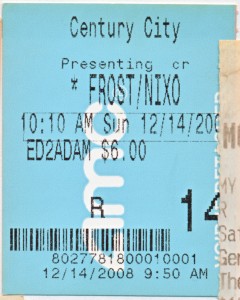Frost/Nixon

I’m sorry; we only validate for the first three hours.
I was on the way out of the Westfield Century City shopping complex, and I was in a good mood. The AMC Century 15 is now my new favorite theatre. It has a Godiva chocolate store out front, the earliest showtimes in Los Angeles County (a 9:45 morning showtime of Bolt in 3D. 9:45!), and, after the remodel, basically empty theatres.

I had just seen Frost/Nixon, which was great, and I was in the midst of that glow that you get after seeing a movie that exceeds your expectations and simply makes you smile.
But the AMC Century City 15 has an undiscovered flaw. I had previously biked there, and so had never dealt with the parking structure. The parking itself wasn’t terrible, but the exit has an undisclosed merge from the bottom level (another in a long line of examples of an idiot architect designing a building as if people will never inhabit it), so that when you exit, you risk smashing into an unseen car behind you. Instead of remodeling, the staff at the Westfield Century City shopping complex had took it upon themselves to hire some poor guy to direct traffic in the hopes of preventing accidents that shouldn’t have been risked in the first place.
Our traffic directing fellow was not happy to be there. Who would be? Some architect got paid to be an idiot, and he’s dealing with the aftermath. He waved at me with his white gloves, and clearly stated that I should stop. Or go. I wasn’t sure which, but he was very sure, and very angry that I didn’t understand. He said quite loudly, “I told you what to do.” I was not gentlemanly about the hostility, and replied, “Don’t be a dick, dude.” Not my finest moment.
We all want to be Jim, but we’re afraid that we come across like Michael Scott. We all want to be Hans Gruber, but we’re worried we may be John McClane.
You heard me.
[/pullquoteL]
And worst still, my post-Frost/Nixon buzz was now ruined. I fumed for a moment, and then plotted: how would I get the feeling back? So I thought back to the movie: what would Nixon do? And I realized it wasn’t so much what Nixon would do, but what he couldn’t.
Any one reading this for the last few months may think that I’m either a masochist, or just very stupid: that I hate movies, and keep going to them anyway. And while it’s true that I get something out of everything I see, it’s been a bleak few months. The truth is, there have been a lot of good movies this year, including one of the greatest ever made (Wall•E), not to mention Happy-Go-Lucky, Reprise and even Journey to the Center of the Earth, which was, after all, in 3D. If you’ve been following these commentaries, I apologize: I just picked a very bad time to start writing about movies.
But that means that the movie gods owed me, big time. An Australia and a Max Payne means that you deserve a Frost/Nixon. Durst I tempt the movie gods by seeing Doubt? Even if it means a Seven Pounds followed by a The Spirit? I durst! I’ll take the hit. Even if the tagline for Bedtime Stories is ‘What if the stories you told came to life?’ turns out not to be a tagline, but an artless description of the plot, I’ll see that too. No problem, movie gods. Give me a Frost/Nixon once in a while, and I’ll keep the faith.
Which is strange, actually, since really good movies aren’t that spectacular. They seem natural, transparent. The filmmaking element disappears, and you don’t want to talk about the movie so much as what the movie is about. How this should be with some films and not others remains a mystery, but since I’ve spent the last few months discussing how movies get it wrong, why not spend a little time on a movie that got it right?
For the sake of brevity, I will call attention to three things, but I fully reserve the right to bring the film up again, as I would with a film like Quiz Show, to which this film compares naturally and favorably. The first thing that springs to mind when watching Frost/Nixon is way it eschews conflict over drama. To explain: let’s say, you were forced at gunpoint (as I was) to see The Day the Earth Stood Still. If the world is coming to an end, and you have Jacob Benson (of the ‘Die Jacob Benson Die’ Benson’s) throwing a tantrum for no reason except to further the plot, that’s conflict. It’s inexplicable, lazy, cheap, and thrown in simply to create tension, even though it doesn’t. It is very much tension in quotes, a placeholder waiting for a writer, director or some inexplicable event to come along and make it better. We wanted something competent to be here, it says; we just didn’t get around to it.
Drama is the same thing, only the characters choose it. When Nixon chooses to be interviewed, risking his political reputation in the process, the consequences of his actions are the stuff of drama, just as when Frost chooses to pursue Nixon for the interview. For Nixon, it’s the money, and the chance to redeem himself, just as it is for Frost. The motives are simple and surprising, but surprising in the way that real life is, in the way that when a girl likes you, she won’t look you in the eye. Conflict, as anyone who watches Law & Order: SVU as much as I do will tell you, is boring; drama, as rare as scent of the first bloom, is not.
The second thing is performance rehearsal. I will make brutal fun of the Oscars in a few weeks as the year comes to an end (though in the way that other people make fun of America, with secret love in my heart), but Frank Langella’s performance really is breathtaking in the sense that I inhaled subconsciously at least three times, and as such, may go ignored. Being in the play of the same name, Mr. Langella has worked and worked and worked on this character until the work disappears. For great performances, it’s either the first take or anything after the thousandth. Anything in between, and the best you can do is get lucky.
Even when the script tries, maybe too hard, to be about the way that Frost ‘destroyed’ Nixon, his character is so indelible that he emerges victorious. This is not to take away from Michael Sheen’s performance, which is just as nuanced and for the same reason (rehearsal), but this is what leads us to the third topic, one which truly elevates the film beyond the others, and this is its reliance on damaged, one-dimensional characters. Now we’ve all been led to believe that one-dimensional characters are bad, but this is usually because they take the form of the everyman, the Shia LaBoeuf’s or Colin Hankses’ of the world, the ordinary Joe who just couldn’t be more boring and unrelateable.
But to really get our sympathy, I would argue the following; make your character damaged, and in a very specific way, and don’t add anything else. In the case of Richard Nixon, we have someone that reveals in an astonishing late night phone call, how desperate it feels to left outside by the rest of the world, so much so that even when you get inside, you still feel it. The sense that no amount of praise or success can redeem us is something that we can instantly relate to, and Nixon emerges as our guy. We all want to be Sipowitz, but we’re afraid that we’re Medavoy. We all want to be Jim, but we’re afraid that we come across like Michael Scott. We all want to be Hans Gruber, but we’re worried we may be John McClane.
You heard me.
This is the secret of Pixar, in a nutshell, that it’s easier to imagine ourselves as a monster who scares children, or a fish that can’t remember for more than a second, or a single-minded robot that can only say one word, than it would be to see ourselves as an ordinary person. Characters in extremes are the way back from the mirror, and Hollywood forgets this lesson at its peril. Characters that no one can relate to are the ones we most relate to, by virtue of the fact that we all know what it’s like to feel like no one can relate to us.
And at the end of the film, as Nixon emerges into the light of day, defeated, he comes across a little dog, and asks of its owner, “This is called a dachshund, isn’t it?”. The women holds up the dog, and Nixon does his best to pet it, tentative and fragile, trying to seem human, and trying to be human at the same time. It’s a moving scene, and not just because I have a dachshund myself. It’s because we all seek out love, and we’re afraid of the price of seeking it out. It’s the best a movie can offer: an image that stays, in this case, a reminder of the delicate humanity in all of us, yearning to be free.
That’s me, I thought, as I drove away, and that’s the guy directing traffic, and the guy who would cut me off in just five seconds time. A bunch of Nixons, bumping into each other, and making ourselves angry in spite of our best intentions. We all want connections.
We just need better architects.
Profits!
Losses!
Thoughts on Frost/Nixon

 [logo]
[logo]

I loooooved this review, now I can’t say more because it would sound stale.